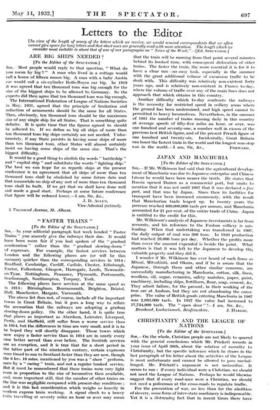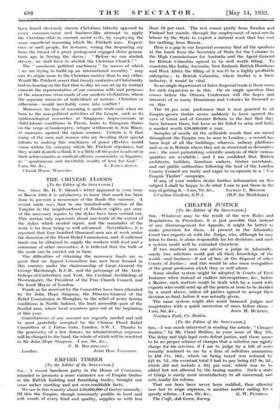CHRISTIANITY AND THE LEAGUE OF NATIONS
[To the Editor of the Sezersroa.] SIR,—On the whole, Christian people are not likely to quarrel with the general conclusions which Mr. Prickett records in your issue of April 30th, about the relation of morality to Christianity, but the specific inference which lie draws in the last paragraph of his letter about the activities of the League is most unfortunate and cannot be allowed to pass unchal- lenged. Mr. Prickett's argument is not unfamiliar. It seems to run : if every individual were a Christian, we should not need the League of Nations. Perhaps he would likewise suggest that if every road-user were a Christian, we should not need a policeman at the cross-roads to regulate traffic.
For the prevention of war, no less than for the abolition of slavery, some form of inter-state machinery is indispensable. Yet it is a distressing fact that in recent times there have
been found obviously sincere Christians bitterly opposed to every common-sense and business-like attempt to apply the Christian ethic to current social evils, by employing the same superficial reasoning which Mr. Prickett.uses. Experi- ence of such people, for in,stance, wrung the despairing cry from the breast of a great protagonist engaged three genera- tions ago in freeing the slaves : "Before we can abolish shivery, we shall have to abolish the Christian Church ! "
The "cumbrous political machinery" by means of which "we are trying to build up an international morality " may owe its origin more to the Christian motive than to any other. Would Mr. Priekett assert that twenty centuries of Christianity had no bearing on the fact that to-day we can set up by mutual
• consent the representative of our common wills and purposes at the numerous cross-roads of our modern civilization, where the separate interests of individuals or nations—Christian or otherwise—would inevitably come into conflict ?
Moreover, his line of reasoning is quite irrelevant when we turn to the non-political activities of the League, such as its epidemiological researches at Singapore, improvements in child-labour conditions in Persia, loans to European States on the verge of bankruptcy, refugee settlement in Asia Minor, or measures against the opium menace. Certain is it that many of the men and women who are devoting their special talents to making this machinery of peace effective would come within the category which Mr. Priekett stipulates, but they would doubtless think it is a little off the point to advertise their achievements as medical officers, economists, or linguists,





































 Previous page
Previous page